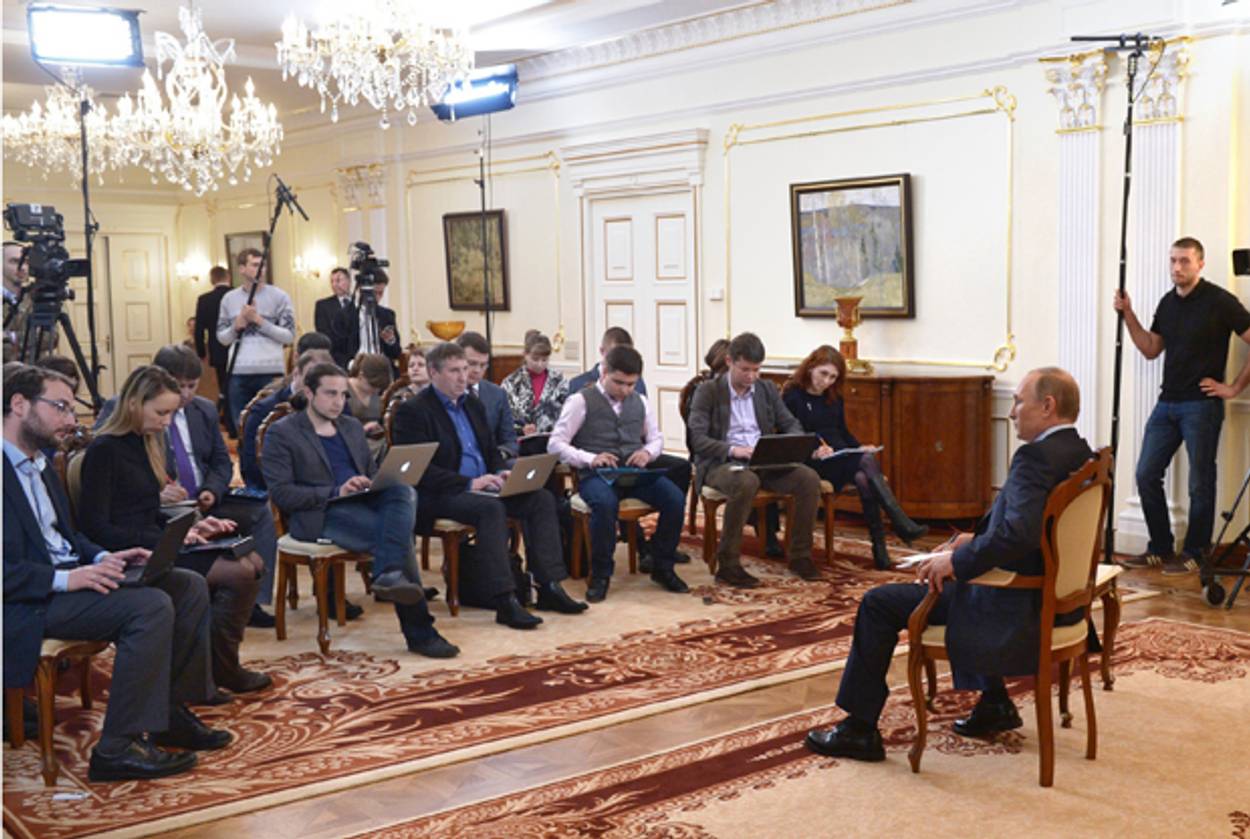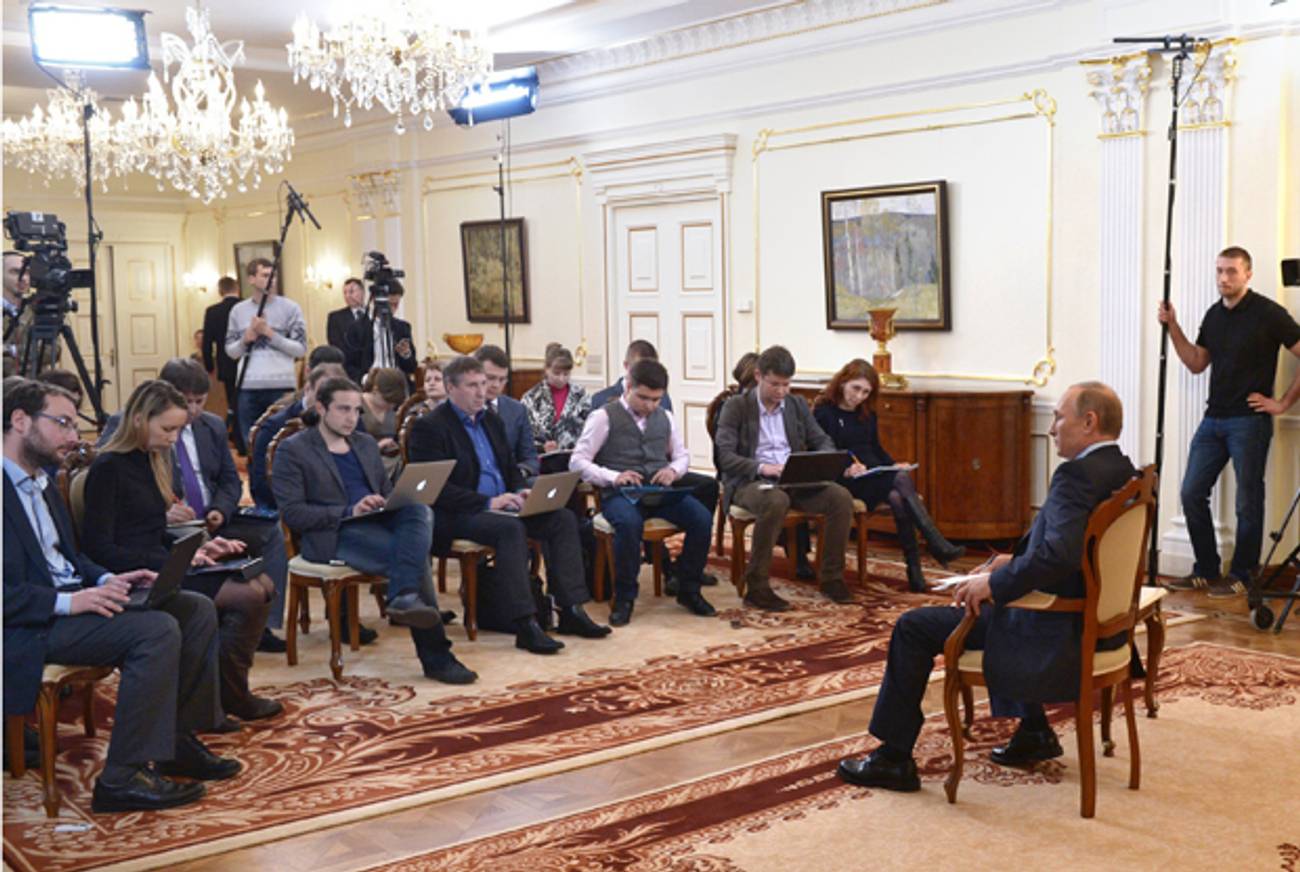Putin Defends Ukraine’s Jews, Slams Ukraine’s Jewish Oligarchs
Cites Ukraine’s appointment of oligarchs as governors as reason for unrest




Yesterday morning, Vladimir Putin, president of the Russian Federation, gave his first post-Crimea invasion press conference. What rapidly became apparent, as he slouched in a gilded hall studded with Russian flags, was that the combination of Putin’s surreal interpretation of events with his lavishly baroque epistemology has given form to some bizarrely contradictory dualities in his worldview. He railed against a politicized judiciary selectively prosecuting the enemies of the chief executive, overlooking that it’s exactly what the Russian Judiciary does routinely; he argued the change of government in Kiev was an armed coup, but the one in Crimea was entirely legitimate. The usage of force by Ukrainians is unjustified, but completely justified from the Russian side.
The Russian leader also insisted that Ukraine’s deposed president, Viktor Yanukovych, retains authority as the country’s elected head of state, but also described him as a corrupt failure whose political career was finished. Putin also admitted that he understood well popular demands for “cardinal changes in government” by Ukrainians—demands, he asserted, that simply stemmed from their “having become habituated to switching one thief and opportunist for another thief and opportunist.” He spat out the word “opportunist” in disgust.
Putin underscored that this radical discontent—what political scientists refer to as a democratic deficit—was the reason Ukrainians were no longer interested in participating in regional elections, and argued the appointment of oligarchs as governors of the Eastern Ukrainian provinces, not the Russian tanks that preceded them, is the reason for the unrest there. “Of course people do not accept this,” Putin thundered—a message which was directed less at the Ukrainians than at his own oligarchs, who shouldn’t entertain any ideas about becoming governors themselves.
And then Putin offered an intimate glimpse into the highly personal power politics playing out among the relatively tiny and tightly interconnected group of oligarchs—all men of a similar generation—who together control vast swaths of the post-Soviet economies. Putin called out one, `monsieur` Ihor Kolomoyskyi—either the second or third richest man in Ukraine and the newly appointed governor of Dnepropetrovsk, the country’s industrial hub—by name. “This man is a unique opportunist,” Putin remonstrated.
Kolomoyskyi is not unique, but he is a figure of collosal wealth and importance in Ukraine’s industrial behemoth of Dnepropetrovsk. Along with his friend and fellow oligarch Vadim Rabinovich, Kolomoyskyi also founded the successful Jewish News One TV station. He has also helped fund and recently inaugurated the Dnepropetrovsk Jewish cultural center, the biggest in the world. In a press conference that Kolomoyskyi held four days ago upon being appointed governor, he admitted that he had been put into place as part of a campaign of “expanding government outside of the purview of traditional politicians.” He also acknowledged that part of his job as the newly appointed governor of Dnepropetrovsk was to “tamp down separatism,” and spoke out against a century of Russian-driven partition of the land. Many Ukrainians assume that he had taken up the position mostly to protect his myriad business interests from being expropriated by the new regime.
Putin, however, had his own axe to grind against Kolomoyskyi on behalf of his friend Roman Abramovich, one of Russia’s wealthiest men. “He even conned our own Abramovich,” Putin asserted. Alternating legalese with tough guy slang, he explained Abramovich had transferred Kolomoyskui millions for a contract several years ago, and Kolomoyskyi other did not finish the job but pocketed the money. “I myself asked Abramovich why he did it later, and he told me he did not think it possible that someone would play him like that,” Putin explained. “This is a real life story. And that is the sort of bounder they wish to make governor!” The point to this brackish bit of business gossip, to put it as crudely as Putin did, was that the Ukrainian Jewish oligarch Kolomoyskyi out-Jewed Russia’s own top Jewish oligarch, Abramovich.
Putin then transitioned his rhetoric smoothly back to the “masked and unidentified armed groups of anti-Semites” running around Kiev with machine guns. Any resemblance to masked and unidentified armed men running around the Crimea with machine guns went unmentioned. What followed was curious display of Putin’s exceedingly odd usage of philo-Semitic tropes to appropriate the Soviet legacy of rescuing all Soviet people, but most especially the Jews, from the specter of fascism.
That the black and red flag of the Ukrainian Fascist partisans of UPA (The Ukrainian Provisional Army) flew over the Maidan is an undeniable fact, but the actual number of fascists in the Kiev streets remains a point of contention. The logic of the Russian chauvinist position in this crisis is that the Ukrainian opposition is composed entirely of Ukrainian fascists, neo-Nazis and Banderovtsi—partisans of the nationalist hero Stepan Bandera—frothing to commit pogroms against Jews as well as ravish Russia’s daughters and outlaw the usage of the Russian language in Odessa, Donetsk and, yes, the Crimea. In Eastern Ukraine, such sentiments amongst ethnic Russians are rooted in memories of World War Two. When expressed by politicians or government propaganda channels in Russia proper, they are manifestations of irredentism and political expediency.
Related: Before Crimea Was an Ethnic Russian Stronghold, It Was a Potential Jewish Homeland
After Yanukovych, Maidan’s Next Fight Will Be To Preserve a Ukraine Safe for Minorities
Vladislav Davidzon is Tablet’s European culture correspondent and a Ukrainian-American writer, translator, and critic. He is the Chief Editor of The Odessa Review and a Non-Resident Fellow at the Atlantic Council. He was born in Tashkent, Uzbekistan, and lives in Paris.